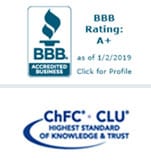

One in four Americans say they will never retire, according to a recent poll from the Associated Press-NORC Center. Their number one motivator? Money–or lack thereof. However, we know that most older workers will need to stop working at some point due to injury, illness, layoffs, or family responsibilities, and they’ll need a solid retirement plan to see them through. Here are four things you can do to make sure you’ll be able to leave the labor force forever.
1. Create a Plan
Don’t want to work in retirement? You’ll need to plan for it. Imagine your life in retirement; will you eat out occasionally? Go on vacation? Buy groceries? You will need to plan and save for daily expenses as well as big-ticket purchases. To see if you are saving enough for retirement, you’ll want to keep these four milestones in mind:
- Age 30: You should have one year’s salary saved in your retirement accounts.
- Age 35: Two years of salary saved.
- Age 60: Eight years of salary saved.
- Age 67: Ten years of salary saved.
You can use this calculator from FINRA to determine exactly how much you should have in your retirement accounts.
2. Increase Your Contributions
If you are behind on saving for retirement, increase how much you are contributing to your retirement accounts. Fortunately, the maximum contribution limits have increased in 2019. 401(k) owners can now contribute up to $19,000 to their employer-sponsored accounts ($25,000 if you are over 50), and IRA owners can contribute up to $6,000 ($7,000 if 50+).
3. Get Rid of Debt
Did you know that the average household carries approximately $8,400 in credit card debt? High-interest debt can eat away at your income and keep you from saving enough for retirement. Not all debt is bad debt; mortgages, for example, are considered to be good debts since homes usually gain value over time. Credit cards and car loans, however, are classic sources of bad debt because they do not offer a return on your investment.
If bad debt is holding you back, try the snowball method. Organize your debts so you can find the account with the lowest balance. Make the minimum payment on your other debts and use any extra cash to pay off your smallest debt. Like a snowball rolling downhill, you’ll gain momentum to tackle your debts as you go.
4. Talk with a Professional
If you don’t see yourself working in retirement, you need a plan that will last. That’s where a professional can help. For people in or near retirement, there are a lot of moving parts: life expectancy, stock market performance, Social Security, and that’s just the tip of the iceberg. Look for a financial professional who will design a retirement plan for your unique situation and give you the confidence to leave the labor force forever.
Don’t miss Roger Cowen on WTNH tommorrow, Wednesday, September 25th, at 9:15 A.M.


Sara McKinney
saractag@gmail.com
As Cowen Tax Advisory Group’s Digital Content Marketing Specialist, Sara provides in-house copywriting and manages the company’s electronic records system, email marketing, and blog.




